Search Results

Interview of Marvin Barkis, October 27, 2017
Interviewed by H. Edward (Ed) Flentje
Marvin Barkis discusses, in detail, the various processes within the House of Representatives in its day-to-day work. He points out differences in working as the majority versus the minority party and talks about working with the governors during his terms in office. When Barkis was the minority leader, he tried to build a sense of community among party members to facilitate working together. Barkis also made changes in legislative procedures to promote efficiency. Much of the interview addresses these internal procedures. Marvin Barkis' primary legislative passion was children’s issues and the interview covers the various attempts to Show Morework on a variety of topics to aid children. He was also involved with school finance, reapportionment, and the death penalty. Show Less
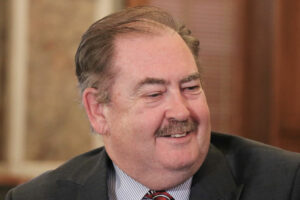
Interview of Tim Shallenburger, September 25, 2020
Interviewed by Alan Conroy
This interview with Tim Shallenburger, former Speaker and twelve-year House member is packed full of interesting anecdotes covering his philosophy of leadership, antics in the House, battles fought and won. Shallenburger was the first "conservative" Speaker following a wave of conservatives being elected beginning in the early 1990's. He candidly discusses why he ran for office in a largely Democratic district, how he moved up in the leadership and developed relationships with other legislative leaders in both House and Senate. Early in his time in the House, Shallenburger was part of a group known as the "rebels". Show More He watched other people's leadership styles and learned how to be a leader himself, first getting elected Speaker Pro Tem and then Speaker, beating Speaker Bob Miller in a "not-so-close" race. Shallenburger learned how to count votes. He doesn't see himself as having an "agenda", other than being fair as a leader. Shallenburger describes the rules changes the rebels made in the House when Jim Braden was Speaker to allow more bills to be heard or pulled out of committee. Bill Graves was Governor throughout all four years of Shallenburger' s term as Speaker. Shallenburger left the legislature to become State Treasurer. After 2010 he served as legislative liaison for Governor Brownback. Shallenburger talks openly about his relationships with numerous governors and senate leaders. The interview closes with a discussion of redistricting. Show Less

Interview of Joan Wagnon, May 11, 2018
Interviewed by H. Edward (Ed) Flentje
Ed Flentje's interview of former Representative Joan Wagnon is lengthy and complete, covering her 12 years in the state legislature, 4 years as Mayor of Topeka, and 8 years as Secretary of Revenue. She talks about the work of the House Taxation Committee in implementing legislation after passage of a constitutional amendment classifying property for tax purposes. Wagnon discusses the 1992 school finance lawsuit which produced massive change in the school funding formula, including how the concepts were developed and what strategies were used to get them passed. The interview covers in detail how the House Democrats interacted with Show MoreGovernor Finney in the 1991 session, when Finney vetoed the major tax bill and the Supreme Court found the school finance formula to be unconstitutional. Wagnon served as facilitator for the Children's Initiatives Committee which Speaker Marvin Barkis chaired. That committee produced fourteen bills that affected children and families. Economic development issues are discussed in the last part of the interview which links Wagnon's legislative interests to her work as Mayor of Topeka: neighborhood revitalization, spreading the tax base from city to county for Washburn University and the library, and developing economic development infrastructure to attract growth and new business for Topeka. She also discusses some of her eight years as Secretary of Revenue, particularly her involvement with the Streamlined Sales Tax.
A version of this interview is also posted on KansasMemory.org, the website of the Kansas Historical Society. Show Less
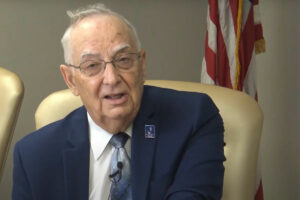
Interview of Dale Dennis, August 28, 2020
Interviewed by Andy Tompkins
People interested in the development of education policy in Kansas will find no better resource than this 2020 oral history interview with Dale Dennis, Deputy Commissioner of Education. The interview was conducted by Dr. Andy Tompkins, a former Kansas Commissioner of Education. During the interview, Dennis speaks candidly about policy development, identifying the issues and the legislators who were intrinsically involved. The interview covers the 1972 lawsuit which was the first dealing with issues of equity in school funding. Twenty years later, a 1992 school finance lawsuit again challenged the lack of equalization which rendered the formula unconstitutional. Dennis explains Show Morein detail the process by which the Legislature, Governor Joan Finney, Speaker Marvin Barkis, and others went about addressing the Court's concerns. By 2000 the Legislature had again failed to fund the school finance formula fully and the Montoy lawsuit arose. Another case, Gannon, began in 2010. This time the problem was the adequacy of the funding to meet constitutional requirements. Moving on from school finance lawsuits, the interview covers school consolidation and related issues of local control. Dennis explains why he started offering budget workshops to school administrators, including the development of software and the use of computers. This interview includes a brief discussion of the 1999-2000 legislation that moved state oversight of community colleges and technical schools (later termed technical colleges) from the Kansas Department of Education to the Kansas Board of Regents. Show Less
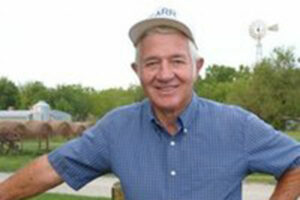
Interview of Gerald (Jerry) Karr, May 11, 2017
Interviewed by Janice Huston
This interview of Senator Jerry Karr by Janice Huston for the Lyon County Historical Society is lengthy, but gives great insight into the 18 years Karr spent in the Kansas Senate. It also covers his academic career which preceded his election and delves into rural life in Kansas. It begins with his Sierra Leone experiences teaching agricultural economics and other teaching jobs in the Midwest. Karr was elected to the state Senate in 1980 which is the time the farm crisis started boiling over in Kansas. During those first 10 years he developed legislation addressing Show Morethe farm crisis, including changing the method of selecting the Secretary of Agriculture, altering the classification and reappraisal of land, and regulating corporate hog farming. His service on the Joint Rules and Regulations Administrative committee helped him shape agricultural policy. He became Minority Leader ten years after his first election. Redistricting in 1991 ended up in the courts and spelled the end of many rural Democrats. There are numerous examples of policy making, particularly the details about the 1992 school finance legislation that amplify others’ accounts of that legislation. His examples of effective leadership and effective campaigning will be of interest to many. The interview also covers communication with constituents in a large district and has anecdotes about issues leaders have to deal with. Karr covers just about all aspects of leading a caucus and life in the Senate in the 1980s and 1990s. Show Less

Interview of Jene Vickrey, September 11, 2020
Interviewed by Alan Conroy
Jene Vickrey talks candidly about his first campaign (where he narrowly defeated then-Speaker Marvin Barkis) as having not much money but "a lot of shoe leather." He discusses his political mentors, Melvin Neufeld and Tim Shallenburger and the advice they gave him in the early years, about lobbyists and handling hot-button issues. He learned not only from his mentors, but other colleagues who helped him, some of whom were Democrats. The interview covers bills he sponsored, many of which were pro-life legislation. He describes the "tough challenges" such as foster care systems (he was a foster Show Moreparent), school finance and taxes. He didn't support casino gambling although his constituents were in favor of it. The interview concludes with Vickrey reflecting on the changes he saw in 28 years, the growth in the number of conservatives and a loosening of the control of the House from leadership to the body itself by rules changes for more transparency as well as becoming more partisan. Show Less

Interview of Kent Glasscock, June 11, 2021
Interviewed by Alan Conroy
As Majority Leader, and then as Kansas House Speaker, Kent Glasscock found ways to work productively with the conservative wing of the Republican caucus. The first part of the interview describes how Glasscock decided to run for office and his six campaigns.
As he moved up in leadership, the interview talks about several situations where his views as a moderate Republican clashed with the growing number of conservatives in the Republican caucus. Finally, Speaker Shallenburger called Glasscock to his office and together they made peace and subsequently worked well together. Glasscock cites the school finance bill that Show Moredealt with a capital outlay for school buildings as one of his best, most long-lasting accomplishments as well as the Confined Animal Feeding legislation. Styling himself as a true "policy wonk", Glasscock's descriptions of legislative antics in passing legislation are really interesting. This interview gives a picture of how the legislature transitioned to conservative control during his 12 years in office. Show Less
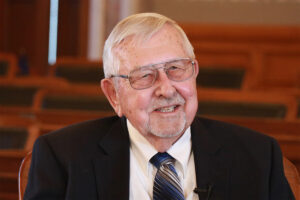
Interview of Jack Wempe, September 28, 2021
Interviewed by Alan Conroy
Jack Wempe of Rice County gave a detailed interview about the decade of the 1990's he spent in the Kansas House of Representatives. He played pivotal roles in the passage of the 1992 school finance bill and legislation to consolidate governance in higher education. He worked with members of both parties to pass legislation important to rural communities as well as education. Wempe became interested in taxation and economic development. Wempe also comments on the shift in philosophy of the Republican party during his time in office and its move to a more conservative leadership. Show MoreAt the conclusion of his legislative service, Wempe was appointed to the Board of Regents where he became chair in 2003. Show Less
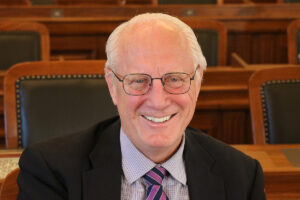
Interview of Joe Knopp, October 15, 2021
Interviewed by Alan Conroy
Joe Knopp's interview takes place 33 years after he left the legislature in 1988 after losing a close election and short-circuiting his political career. His recollections are still vivid and his interview describes a legislature that has changed considerably in recent years.
Knopp served from 1981 through 1988 and during that time as chair of the House Judiciary Committee was involved in many significant issues: medical practice, corporate hog farming, changes in the DUI law, death penalty, reapportionment, severance tax. As Majority Leader he dealt with a growing split in the Republican caucus --led by the Rebels. Show More He tried to get votes for a special session on a new highway plan. He describes in detail the process of getting elected to a leadership position and how he won by one vote. He talks candidly about balancing his personal views with those of his constituents, particularly on liquor and gambling issues --and he speaks analytically about losing the election in 1988 and again in 2012 when he ran for the Senate. Good insights for anyone contemplating a run for public office. Show Less

Interview of George Teagarden, October 28, 2022
Interviewed by Duane Goossen and Joan Wagnon
This interview with George Teagarden covers the 14 years he spent in the House of Representatives, mostly serving on the Ways and Means/Appropriations committee. Teagarden describes the committee whose job was to work the state budget every year. In the early years it was characterized by cooperation and working together on issues regardless of party. He notes that cooperation was changing as he left and becoming much more partisan. The use of provisos often bypassed the traditional legislative route for policy-making. He followed his legislative service by working 16 years as Kansas Livestock Show MoreCommissioner. The livestock industry had appointed him to that job, but it is now a gubernatorial appointment. Show Less
